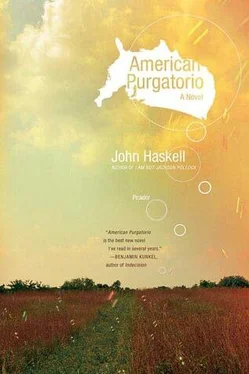John Haskell - American Purgatorio
Здесь есть возможность читать онлайн «John Haskell - American Purgatorio» весь текст электронной книги совершенно бесплатно (целиком полную версию без сокращений). В некоторых случаях можно слушать аудио, скачать через торрент в формате fb2 и присутствует краткое содержание. Год выпуска: 2006, Издательство: Picador, Жанр: Современная проза, на английском языке. Описание произведения, (предисловие) а так же отзывы посетителей доступны на портале библиотеки ЛибКат.
- Название:American Purgatorio
- Автор:
- Издательство:Picador
- Жанр:
- Год:2006
- ISBN:нет данных
- Рейтинг книги:3 / 5. Голосов: 1
-
Избранное:Добавить в избранное
- Отзывы:
-
Ваша оценка:
- 60
- 1
- 2
- 3
- 4
- 5
American Purgatorio: краткое содержание, описание и аннотация
Предлагаем к чтению аннотацию, описание, краткое содержание или предисловие (зависит от того, что написал сам автор книги «American Purgatorio»). Если вы не нашли необходимую информацию о книге — напишите в комментариях, мы постараемся отыскать её.
Los Angeles Times
American Purgatorio — читать онлайн бесплатно полную книгу (весь текст) целиком
Ниже представлен текст книги, разбитый по страницам. Система сохранения места последней прочитанной страницы, позволяет с удобством читать онлайн бесплатно книгу «American Purgatorio», без необходимости каждый раз заново искать на чём Вы остановились. Поставьте закладку, и сможете в любой момент перейти на страницу, на которой закончили чтение.
Интервал:
Закладка:
At the intersection of the circular drive and one of the radial streets that feed the university there’s a liquor store and she goes in. Rather than waiting outside, I also go in. Why not? I see her head looking into the refrigerated cabinets and I look at bottles of wine, all the time watching her. She’s buying some kind of juice or fruit beverage and I’m thinking about her, and I’m also thinking about buying a reasonably priced California wine. I wait for her to pay for her fruit drink at the counter, and then, as she exits out the door, I decide to buy a disposable camera. I’m thinking it might come in handy, but when I pay for it, I’m about thirty-five cents short. The man behind the counter, with his combed gray hair, tells me to give him what I have, take the camera, and pay him later. The man insists I take it, and for some reason, looking at the man, and seeing beyond his bristly mustache and bad teeth to the generous smile forming on his cheeks, I do. I thank the man and tell him I don’t need a bag. I hurry out of the liquor store because, like a good tracker, I don’t want to lose my quarry.
But when I get outside, worried that she’s gone off and that I’ll have some catching up to do, I find her instead, standing right in front of me, wrestling with the plastic wrapper on her drink. I watch her for a long moment with a strange sense of pleasure and fulfillment. In a way I enjoy her struggle. I feel lifted by her momentary difficulty, and feeling garrulous, I speak to her. “Having a little trouble?” I say.
She looks up and smiles. “Protecting us from ourselves,” she says, and when she finally gets the plastic removed from the bottle she throws the packaging into the trash and begins walking back to the motel.
That’s where I would be going too, but because I don’t want to seem to be following her, I don’t move. I don’t know if I should be walking with her or not, and so not knowing, I deal with my own packaging, and all the time I’m dealing with it I’m thinking about her, the way her hair fell, or was blown, by the spring winds, across her face, and her collar pulled up against the wind, and her fingers, and her skin, a dark skin or softly tanned skin, and her mouth when she smiled. Standing there, I wish I would have remembered more of her, and other parts of her. I’m already forgetting so much, and I think, If only I had a better memory.
That’s why I turn, follow her tracks, and catch up with her at the edge of a bulldozed field. It’s empty at the moment, awaiting some future construction, and she’s gone out there for some reason, to look around and breathe, and I find myself pulled out there as well, to her.
I say pulled because, although I’m holding my little camera, I couldn’t really have said I had any reason to be following her. We’re standing on the site of the future mini-mall, and nothing is said about the odd coincidence of our seeing each other twice in the same day.
“Are you taking pictures?” she says.
“Yes,” I say, and lift the camera to prove it.
“Of?”
“Landscapes,” I say. “Buildings mainly. And people, if they’re around.”
“Doesn’t look very populated now,” she says, indicating the pallets of cinder block.
“No,” I say, and although I’m looking at her, I’m also seeing everything around her, the light and the air and the leveled dirt.
“Don’t let me stop you,” she says.
“As a matter of fact,” I say, and I ask her if she’d be willing to stand in a picture. “To give scale,” I say. And when she stands and strikes an appropriate pose, I adjust the composition. I ask her not to smile. She doesn’t smile. “That’s perfect,” I say, and then I snap the picture.
“Take another,” she says. “Sometimes the first one … In case I smiled.”
“Okay,” I say, and I take another.
“What about this?” she says, and she puts her foot on a stack of two-by-fours. I take the photo and when we stand together, afterward, she asks me why no smiling.
“So as not to distract from the landscape,” I say.
“How would a smile distract from that?”
“You’re right,” I say. “It wouldn’t.”
And that’s about all we say. We walk together to the motel, just walking along, the wind cool, the sun warm, just walking together until we get to the motel stairway, where we stop. I would like to keep walking, to continue on our common trajectory, and although she seems to enjoy being looked at, and I would like to keep looking, my room is in a different direction. So we start to float apart, like two ice floes slowly flowing in different directions. I want to pull them (the ice floes) together so I say one more thing to her. I tell her she looks like Joni Mitchell.
“Maybe it’s the beret,” she says.
I shrug, and when she turns to go I say, “Who did you say you knew around here?”
“I didn’t say,” she says. “I’m with my friends.”
And then she walks up to her room. And I imagine that happiness probably exists up there in that room, waiting. Not for me, but for her. “Good luck,” I say, half aloud, either to her or the stairway she just walked up, and although I’m saying “Good luck” to her, I’m wishing that some of that luck was mine.
I can tell I need to sleep. I’m experiencing sleep deprivation, which is causing me to stand there long after she’s walked away, not moving, staring at the concrete staircase. Later, in my own room, in my bed by the window, I think about her. I would like to go to sleep but I keep having these thoughts, and although they’re my thoughts, they have a mind of their own.
3
In Melville’s Billy Budd, the eponymous young sailor is called — in an expression from another time — a natural man. He’s a man with grace and generosity of spirit. And Claggart, his nemesis in the story, can’t stand the natural attraction people feel for Billy, including his own attraction. Holding on to the dwindling lie of his own superiority, he torments Billy and plots against him, and all because of his inability to live without some barrier between him and what he sees as a threat to what he believes he is. We don’t know the whole history of Claggart so we don’t know if maybe his obsession with destroying Billy Budd is a way to avoid looking at some lack of something in himself. But there he is.
And there I am, walking out my door to the motel parking lot, which is empty except for the dark Mercedes, nose to nose with the maroon station wagon. I walk across the parking lot, like walking across a frozen lake, walking to what may or may not be my old car, and when I get to the car, Linda is sitting behind the steering wheel rolling down the window.
“I see you’re still fascinated by the car,” she says.
“I didn’t see you here,” I say.
“No?” she says.
“No,” I say. “Not really.” Looking down from the scarf on her head to the handle of her door, I notice some pieces of broken glass beneath the left front tire of her car. I don’t tell her about the glass, but because I want to think of myself as a good person, I offer her a ride in my car. “Do you need a ride?” I say.
“I’m fine,” she says. And she notices that I’m looking at her door handle, not her, and she says, “Do you need a ride somewhere?”
“I have a car,” I say, pointing to the Pulsar, which is parked by the empty swimming pool.
So she starts the car, and it sounds like the old maroon Tracer. I can see that when she drives away she’ll drive over the glass, and you might think: How can I do that? How can I let her drive off with the glass beneath her tire?
How I do that is called interpretation. I’m trying, in my mind, to interpret my actions as the actions of a good person. But it’s not that easy because, although I intend to tell her, and in fact am thinking of a graceful way to do it, at some level I want to deny her the happiness that ought to be mine, or had been mine, the happiness that I thought I wanted. As if, in the universe, there’s only a limited amount of happiness and it’s either hers or mine.
Читать дальшеИнтервал:
Закладка:
Похожие книги на «American Purgatorio»
Представляем Вашему вниманию похожие книги на «American Purgatorio» списком для выбора. Мы отобрали схожую по названию и смыслу литературу в надежде предоставить читателям больше вариантов отыскать новые, интересные, ещё непрочитанные произведения.
Обсуждение, отзывы о книге «American Purgatorio» и просто собственные мнения читателей. Оставьте ваши комментарии, напишите, что Вы думаете о произведении, его смысле или главных героях. Укажите что конкретно понравилось, а что нет, и почему Вы так считаете.











